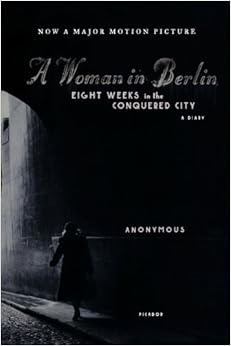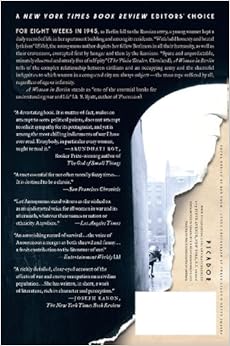From Publishers Weekly
Starred Review. Anonymous, then a 34-year-old journalist, started this eight-week diary in April 1945, when the Russians were invading Berlin and the city's mostly female population was heading to its cellars to wait out the bombing. Anyone who was able looted abandoned buildings for food of any kind. Soon the Russians were everywhere; liquored-up Russian soldiers raped women indiscriminately. After being raped herself, Anonymous decided to "find a single wolf to keep away the pack." Thanks to a small series of Russian officers, she was better fed and better protected at night. Her story illustrates the horror war brings to the lives of women when the battles are waged near a home front (rather than a traditional battlefield). In retrospect, she advises women victimized by mass rape to talk to each other about it. Once the war was officially over, the real starvation began; by the time the author's soldier boyfriend returned to Berlin, she was too hungry and hurt to deal with him. When the radio reported concentration camp horrors, she was pained but unable to quite take it in. The author, who died in 2001, has a fierce, uncompromising voice, and her book should become a classic of war literature. First published in 1954, it was probably too dark for postwar readers, German or Allied. Now, after witnessing Bosnia and Darfur, maybe we are finally ready. New translation includes previously untranslated portions.
(Aug. 4) Copyright © Reed Business Information, a division of Reed Elsevier Inc. All rights reserved.
--This text refers to an out of print or unavailable edition of this title.
The author of this diary was a 34-year-old journalist, now deceased, who consistently refused to reveal her identity publicly. She spoke some Russian and seemed liberal in outlook. Her chronicle was first published in 1953; after remaining dormant, it was republished 50 years later in Germany. This stunning account covers the period from late April to mid-June 1945, beginning with the massive Soviet bombardment of Berlin and ending with the opening weeks of the Soviet occupation. The author is a keen observer of the ironies, even the absurdities, of a collapsing society, but this is a work of great power. At times, one can virtually smell the fear as people cower in basements as the bombardment intensifies. When Russian troops arrive, they are, at first, comically playful as they seem intent on accumulating watches and bicycles. Then the rapes begin and there are scenes of casual but horrifying brutality. The author recounts her own rape with an unsettling detachment. This is a devastating and rare glimpse at ordinary people who struggle to survive.
Jay FreemanCopyright © American Library Association. All rights reserved
--This text refers to an out of print or unavailable edition of this title.







